 As was the case with Hunter X Hunter 2011 and pretty much every truly great battle shounen (for me that’s a short list), while Boku no Hero Academia can kill with the blockbuster episodes, it’s the ones like this that truly set it apart. Indeed, for me the ability to excel at both rather than either/or is one of the crucial baseline qualifiers for a series in this genre to be considered elite. And make no mistake, these episodes are often very important in the overall framework of the narrative – with this week’s BnHA being anything but an exception. It was a big ‘un for any number of reasons.
As was the case with Hunter X Hunter 2011 and pretty much every truly great battle shounen (for me that’s a short list), while Boku no Hero Academia can kill with the blockbuster episodes, it’s the ones like this that truly set it apart. Indeed, for me the ability to excel at both rather than either/or is one of the crucial baseline qualifiers for a series in this genre to be considered elite. And make no mistake, these episodes are often very important in the overall framework of the narrative – with this week’s BnHA being anything but an exception. It was a big ‘un for any number of reasons.
 I think Horikoshi Kouhei is often at his very best when he slows down and really looks deep into the mind of one of his villains. Stain remains one of the seminal masterstrokes of My Hero Academia, and his influence continues to impact the story in ways both subtle and gross. When we really get inside somebody like Twice (Endou Daichi) BnHA soars. Villains in this story are real people, and not clones (perhaps there’s irony in using Twice as an example of this, but there it is).
I think Horikoshi Kouhei is often at his very best when he slows down and really looks deep into the mind of one of his villains. Stain remains one of the seminal masterstrokes of My Hero Academia, and his influence continues to impact the story in ways both subtle and gross. When we really get inside somebody like Twice (Endou Daichi) BnHA soars. Villains in this story are real people, and not clones (perhaps there’s irony in using Twice as an example of this, but there it is).
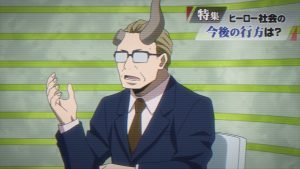 With all due respect to Horikoshi-sensei’s writing, this ep was an example of how the anime has often improved on the manga. The first ten minutes, mostly consisting of an extended internal narrative by Twice, were utterly brilliant. We met Twice in the Forest Training Camp arc, but it’s here that he becomes a fully-fledged person. Fascinating, troubled, confused about what he is yet a keen and even brilliant observer (he gutted Endeavor like a fish) of the changing world around him. The more we learn about Twice the more we want to learn about him, and the more conflicted our feelings will be later if he goes head-to-head with the heroes (heroes in both the literal and literary sense).
With all due respect to Horikoshi-sensei’s writing, this ep was an example of how the anime has often improved on the manga. The first ten minutes, mostly consisting of an extended internal narrative by Twice, were utterly brilliant. We met Twice in the Forest Training Camp arc, but it’s here that he becomes a fully-fledged person. Fascinating, troubled, confused about what he is yet a keen and even brilliant observer (he gutted Endeavor like a fish) of the changing world around him. The more we learn about Twice the more we want to learn about him, and the more conflicted our feelings will be later if he goes head-to-head with the heroes (heroes in both the literal and literary sense).
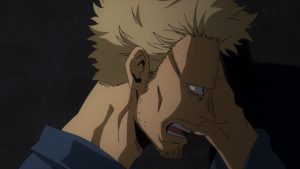 That A-part is over seemingly in the blink of an eye, and the camera returns to U.A., where things are (as usual) in motion. As Deku and Bakugo serve out their suspensions, Class 1-B’s Monoma reveals that his entire class passed the provisional license exam, and the principal gives a speech that reeks of nervous tension, giving brief mention of a “hero work” program that the grommets in the first year have never heard of. This seed, once planted in the ground of young minds fertile with insatiable curiosity, takes root to the point where Aizawa has no choice but to reluctantly address it in class earlier than he planned to.
That A-part is over seemingly in the blink of an eye, and the camera returns to U.A., where things are (as usual) in motion. As Deku and Bakugo serve out their suspensions, Class 1-B’s Monoma reveals that his entire class passed the provisional license exam, and the principal gives a speech that reeks of nervous tension, giving brief mention of a “hero work” program that the grommets in the first year have never heard of. This seed, once planted in the ground of young minds fertile with insatiable curiosity, takes root to the point where Aizawa has no choice but to reluctantly address it in class earlier than he planned to.
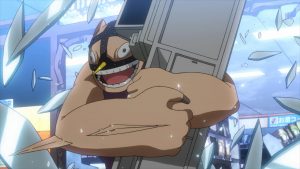 There’s a recurring theme here to be certain. This program – a far more intensive version of the internships they’ve already completed – isn’t supposed to be the province of first-years. But with the fall of All Might the old ways don’t seem to apply any longer. Yuuei and the Hero Association seem to be in reactive mode, with the enemy setting the agenda and the powers that be constantly trying to keep up. Eraserhead calls in some special guests (once Izuku has returned from his suspension, a day earlier than Kacchan – who Aizawa interestingly decided not to wait for) to explain the program to the kids of 1-A. This is the “Big Three” of Yuuei, the top-ranking third-year students and next-in-line top heroes.
There’s a recurring theme here to be certain. This program – a far more intensive version of the internships they’ve already completed – isn’t supposed to be the province of first-years. But with the fall of All Might the old ways don’t seem to apply any longer. Yuuei and the Hero Association seem to be in reactive mode, with the enemy setting the agenda and the powers that be constantly trying to keep up. Eraserhead calls in some special guests (once Izuku has returned from his suspension, a day earlier than Kacchan – who Aizawa interestingly decided not to wait for) to explain the program to the kids of 1-A. This is the “Big Three” of Yuuei, the top-ranking third-year students and next-in-line top heroes.
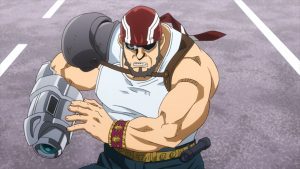 As it turns out, Deku has met one of this trio already – Togata Mirio (Shingaki Tasusuke). Mirio has come to check out Deku as he works at his cleaning punishment duties, curious about the first-year who’s generating so much buzz. The first thing I – and many – noticed about Mirio in the manga was his uncanny resemblance to Tintin, the creation of Belgian cartoonist Herge’ and one of the most iconic fictional characters in Western literary history. Indeed, Horikoshi confirmed recently that Tintin was the model for the character at least visually (and I would argue more than visually at least a little, but I won’t dig deeper than that for now for fear of spoilers). There’s plenty of time to get to know Mirio and his fellow Big Three, but that’s for next week and beyond – for the moment, this is just another transition point for a story that never sits still, and seems to have been planned out in exacting detail from the very beginning.
As it turns out, Deku has met one of this trio already – Togata Mirio (Shingaki Tasusuke). Mirio has come to check out Deku as he works at his cleaning punishment duties, curious about the first-year who’s generating so much buzz. The first thing I – and many – noticed about Mirio in the manga was his uncanny resemblance to Tintin, the creation of Belgian cartoonist Herge’ and one of the most iconic fictional characters in Western literary history. Indeed, Horikoshi confirmed recently that Tintin was the model for the character at least visually (and I would argue more than visually at least a little, but I won’t dig deeper than that for now for fear of spoilers). There’s plenty of time to get to know Mirio and his fellow Big Three, but that’s for next week and beyond – for the moment, this is just another transition point for a story that never sits still, and seems to have been planned out in exacting detail from the very beginning.


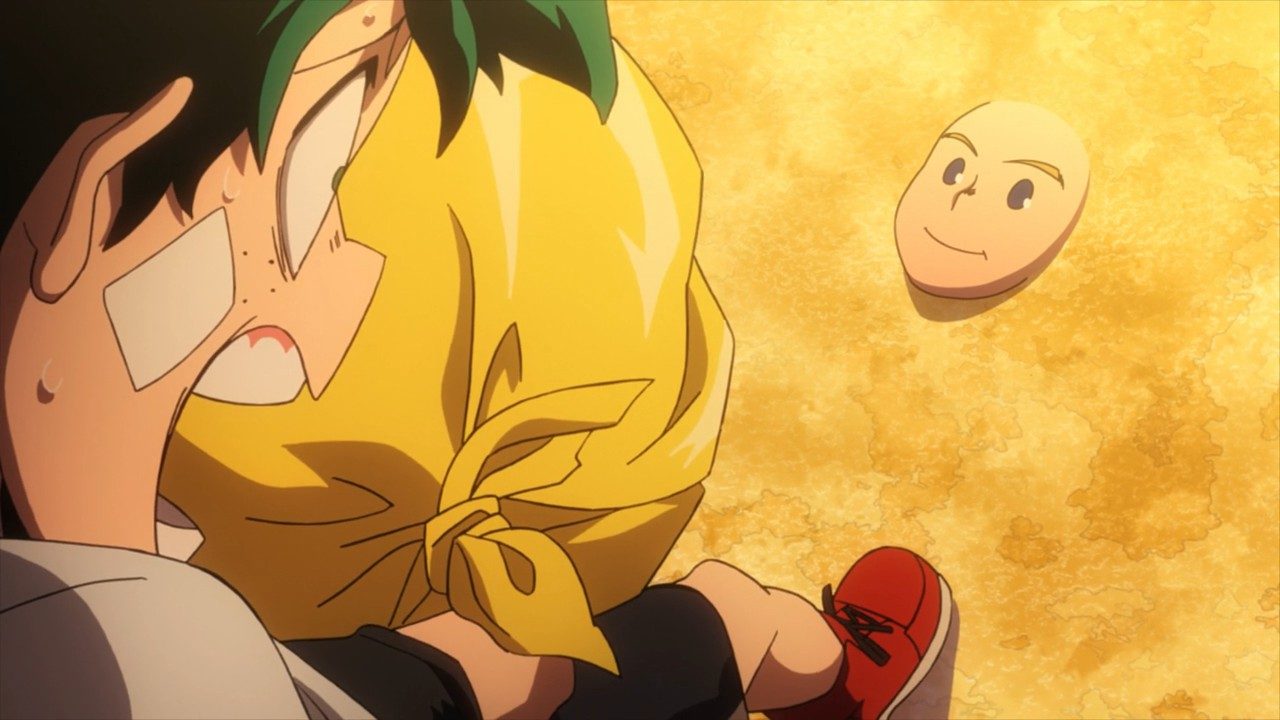
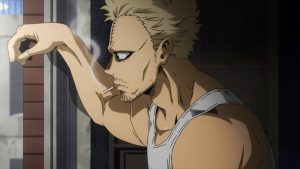

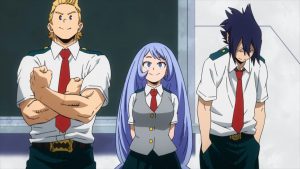
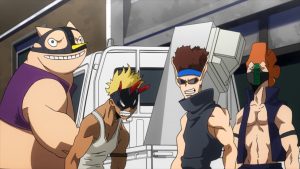

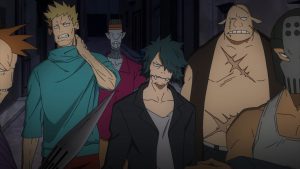

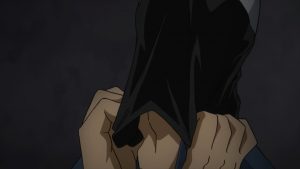

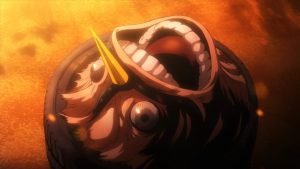

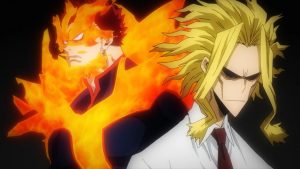


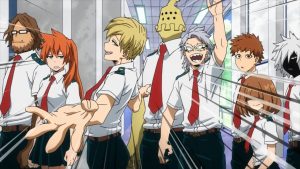


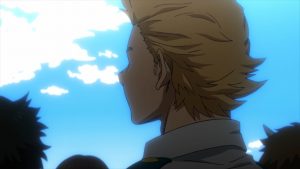
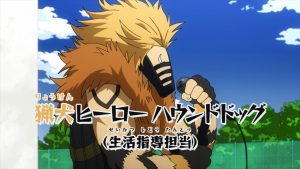
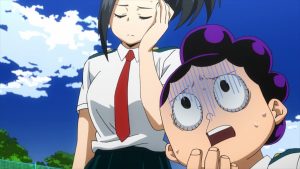

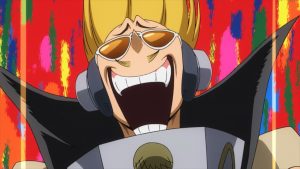
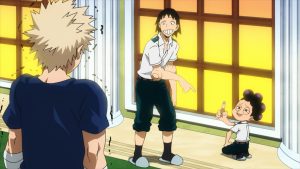

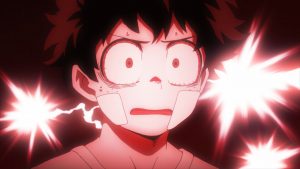
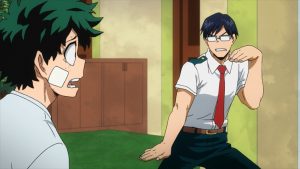
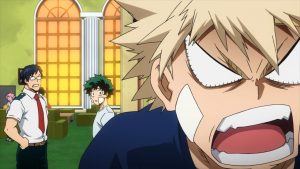
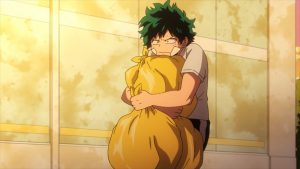
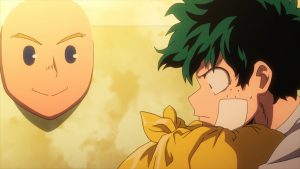
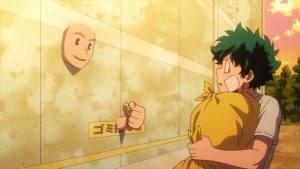
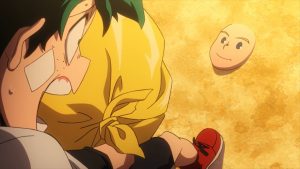

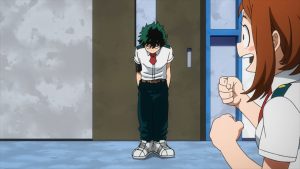



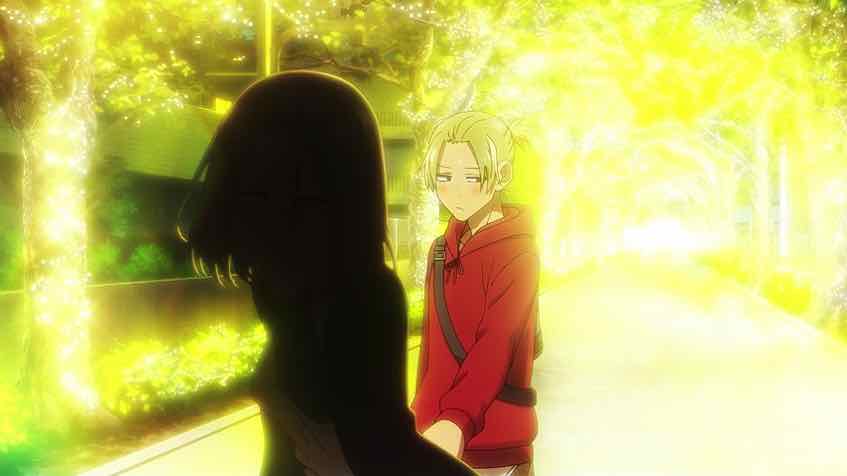
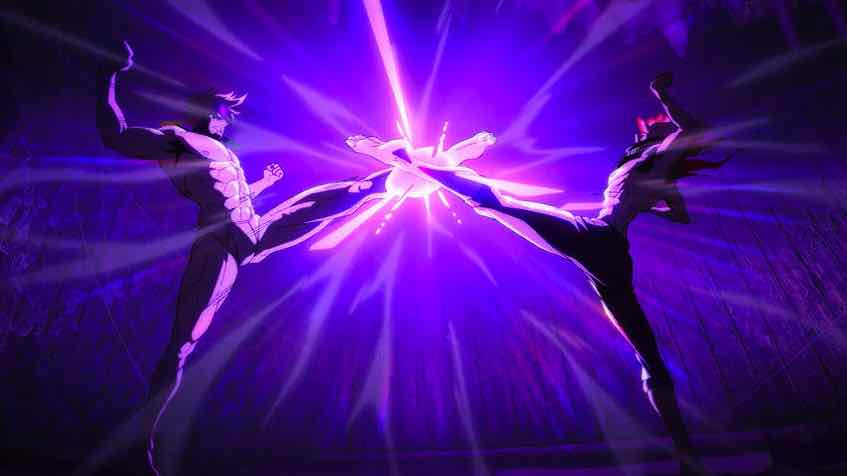
Stefan
September 22, 2018 at 6:42 amI’ve a little quibbles about the logic of Twice’s backstory and opening up the possibility of further first-year exposure to villains, but damn part A reminds me of some scenes in Shouwa Rakugo for some reason. The subtle reflection about how the world’s changing.
Guardian Enzo
September 22, 2018 at 6:46 amAlmost no fans of the series will remember it as such, but I think it’s some of BnHA’s finest stuff.
The wild guesser
September 23, 2018 at 12:41 amHonestly, I thought Mirio looked more like the Fallout boy from the Fallout Series te first time I saw him, but Tin tin is a more accurate observation.
Passa
September 23, 2018 at 12:48 amThank you for mentioning Tin Tin!
I was staring at him the whole time wondering why my brain found him so familiar.
Guess I gotta read about him cus I only know him in passing…
Bob
September 23, 2018 at 2:21 am“With all due respect to Horikoshi-sensei’s writing, this ep was an example of how the anime has often improved on the manga.”
By virtue of execution? Because all of that material was lifted directly from the manga.
Guardian Enzo
September 23, 2018 at 7:59 amYes, execution. Another outstanding seiyuu choice, great direction (not overselling it with too much BGM, for example) cinematography. It just soared.
animealex
September 23, 2018 at 5:08 amI never thought about Twice as much as about the more flashier members of the LoV, but he is among my favourite Villains in this series. I hope that does make some sense, because on the one hand I like him, on the other hand, as paradoxical as it my sound with such a disturbed and tragic character, it’s all out and in the open with him. He feels “real” and is intelligent, observant and (most important) self reflective. This last point makes him also a tragic character and he has some of my sympathy. But not for one moment will I root for him in a fight against a real hero, like most of the 1A students. Why? Because he knows what’s right and wrong (astonishing in face of his apparent insanity!) and still remains on the side of wrong, because they accept him as being one of them. And this side of wrong is willing to kill and maim minors, something many fans seem to forget when they gush (on other sites) how cool the LoV are. But this are still very evil people and I don’t think for one second that Twice would’ve hesitated to kill Shoto while fighting him in the camping arc.
That said, stellar episode and thanks, as always, for the nice review!
Guardian Enzo
September 23, 2018 at 8:03 amI generally agree with that, but right and wrong isn’t always as clear-cut in BnHA as it would be in a simpler series.
Yann
September 23, 2018 at 5:51 amI think he doesn’t wait for Kacchan because he failed the exam anyway and won’t be able to participate, no?
Ha ha… I was wondering if you’d pick up on Tintin, I guess he’s famous enough even in the US. The Belgian/French way of drawing eyes as a big black dot is kinda weird in the context of an anime though…
The first part of the episode is definitely some great stuff and part of what sets BnH apart. I’m pretty sure a lot of fans of the show agree. Give us a little more credit! 😉
Guardian Enzo
September 23, 2018 at 8:02 amTintin is famous everywhere, but only in the US I think with people over a certain age or literary temperament. But I saw the Tintin comments popping up as soon as this chapter ran in the manga, so I think a lot of people saw that right away.
Guardian Enzo
September 23, 2018 at 8:07 amYeah, I know but… Psychologically speaking I think it’s still an interesting decision = what does one day matter? You don’t see him kick Shouto out of the room for it…